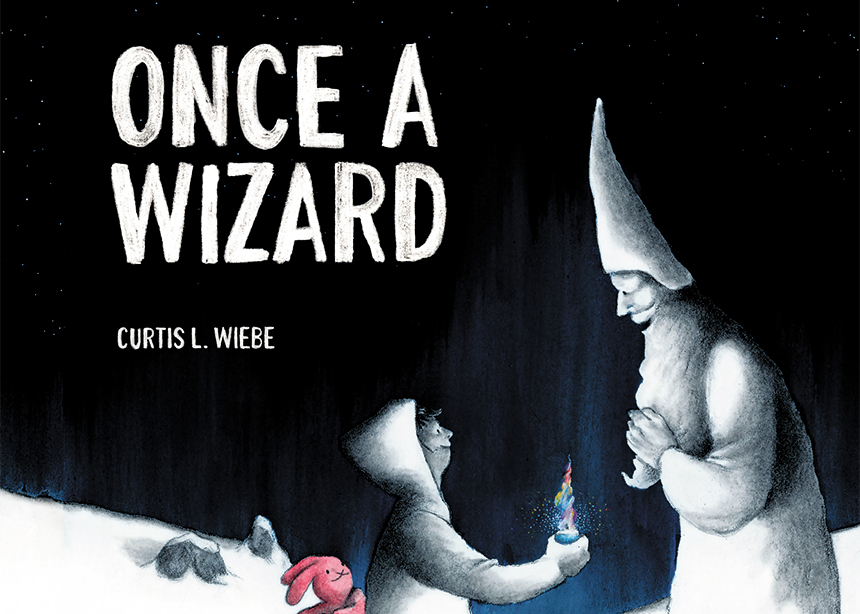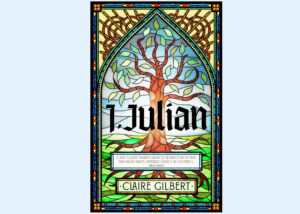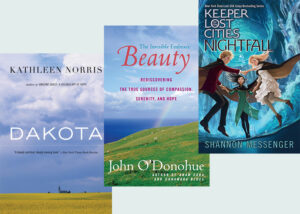A new book invites readers to explore themes of loss and grief while imagining their own story.
Once a Wizard is a wordless children’s book created by Winnipeg author and illustrator Curtis L. Wiebe. It tells the story of Ari, who attends the funeral of Uncle Wizard. Later, Ari meets Uncle Wizard in a dream. Together, they embark on an adventure through a snowy land, encountering a magic candle, a living stuffed toy, a goblin and a giant.
Wiebe, who attends Hope Mennonite Church in Winnipeg, had the initial idea for the book more than 10 years ago.
“I have always had a love for stories of fantasy and adventure—tales that follow a young protagonist through other worlds of strange beauty and hidden dangers,” he writes in an author’s note in the book. “For me, these books and films were not merely escapist entertainment, but stories that interpreted the shadow play of my inner world as something I could understand.”
He goes on to recall “the impact of meeting death face-to-face the first time I saw a loved one’s body in an open casket.” Looking at his grandfather’s lifeless body, Wiebe felt fear, fascination, sadness and curiosity.
“In the story of Once a Wizard, the emotions I experienced as a child seeing my grandpa’s body and confronting the reality of death are translated through Ari’s dream journey,” Wiebe writes.
The Crisis and Trauma Resource Institute in Winnipeg published the book. Vicki Enns, the institute’s clinical director and a registered marriage and family therapist, served as a consultant on the project. Together, Wiebe and Enns aimed to create a book that would be both interesting for children and helpful for them to explore the topic of grief.
The book is wordless so that young readers can help tell the story and fill in details that reflect their own experiences and imagination. “No way is the wrong way to interpret the story,” Wiebe said during a book launch event held on Zoom at the end of February.
Tanya Hoover, a counsellor who often uses children’s books when she meets with young people for therapy, said at the launch that she is already incorporating Once a Wizard into her practice. “It opens the door to the topic of loss and it leaves so much room for the child and the adult they are reading with to take it any direction that feels right for them,” she said.
Hoover used the book in a session with a nine-year-old client who was struggling with her parents’ divorce and who had trouble talking about difficult things. A straightforward story about divorce would not have been appropriate for this child, Hoover said, so she turned to Once a Wizard. “When we were done [reading] the book, I noted there are many kinds of losses, and this opened the door to her talking about her own loss.”
The book includes tips for helping young people to read the story, questions adults can ask the children they are reading the story with, and ideas for activities related to the book. The Winnipeg institute has also produced additional resources that are available for free online.
For Wiebe, who is an accomplished sculptor, animator, costume designer, puppeteer, musician and teacher, and an award-winning filmmaker, working on Once a Wizard was a chance to return to his first love: drawing. He has always enjoyed children’s books, he said, because they give the author “licence to be simple—often deceptively so.”
“The best ones . . . speak to the child in all of us,” he said. “Hopefully [people of all ages] will pick up this book and see something of themselves in it, and no matter what they are feeling, know that they are not alone.”
For more information, visit bit.ly/WizardBook.
Related stories:
Recommended reads: Fourteen Mennonites talk about the books that have impacted them
Watch: Winnipeg artist Curtis L. Wiebe is ‘The Imperfectionist’
Secondhandpants surprised by popularity








Leave a Reply
You must be logged in to post a comment.